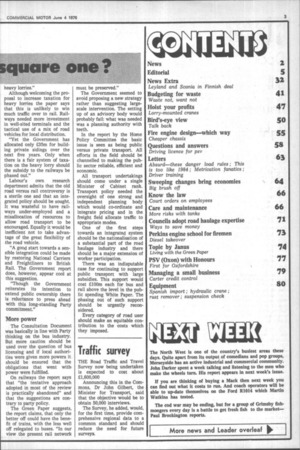4;ipiare one?
Page 5

If you've noticed an error in this article please click here to report it so we can fix it.
heavy lorries."
Although welcoming the proposal to increase taxation for heavy lorries the paper says that this is unlikely to win much traffic over to rail. Railways needed more investment in well-sited terminals and the tactical use of a mix of road vehicles for local distribution.
"Yet the Government has allocated only £35m for building private sidings over the next five years. Only when there is a fair system of taxation on the heavy lorry should the subsidy to the railways be phased out."
Labour's own research department admits that the old road versus rail controversy is a sterile one and that an integrated policy should be sought. It was wasteful to have railways under-employed and a misallocation of resources to allow road transport to be encouraged. Equally it would be inefficient not to take advantage of the great flexibility of the road vehicle.
"A good start towards a sensible integration could be made by restoring National Carriers and Freightliners to British Rail. The Government report does, however, appear cool at this suggestion.
"Though the Government reiterates its intention to extend public ownership there is reluctance to press ahead with this long-standing Party commitment."
More power
The Consultation Document was basically in line with Party thinking on the bus industry. But more caution should be used over the question of bus licensing and if local authorities were given more powers it should be ensured that the obligations that went with power were fulfilled.
On railways the report says that "the tentative approach adopted in most of the review is practically abandoned" and that the suggestions are contrary to party policy.
The Green Paper suggests, the report claims, that only the better off could have the benefit of trains, with the less well off relegated to buses. "In our view the present rail network must be preserved."
The Government seemed to avoid proposing a new strategy rather than suggesting largescale intervention. The setting up of an advisory body would probably fail: what was needed was a planning authority with teeth.
In the report by the Home Policy Committee the basic issue is seen as being public versus private transport. All efforts in the field should be channelled to making the public sector reliable, efficient and economic.
All transport undertakings should come under a single Minister of Cabinet rank. Transport policy needed the oversight of one strong and independent planning body which would co-ordinate and integrate pricing and in the freight field allocate traffic to appropriate modes.
One of the first steps towards an integrated system should be the nationalisation of a substantial part of the road haulage industry and there should be a major extension of worker participation.
There was an indisputable case for continuing to support public transport with Large subsidies. This support would cost £100m each for bus and rail above the level in the public spending White Paper. The phasing out of such support should be urgently reconsidered.
Every category of road user should make an equitable contribution to the costs which they imposed.




























































































































